Woman Only Texts Friend For Money, She Finally Snaps Back
OP has known “Miley” since childhood. They grew up poor, lived together at times, but had a falling out years ago due to theft and immaturity on both sides. Recently, they reconnected, but the renewed friendship hasn’t felt genuine. Out of about ten conversations in the last two years, most were Miley asking for small sums of money ($5–$15). OP gave money at first, no expectation of repayment, but Miley never paid anything back.
Over time, OP began dreading her messages, since they almost always led to requests for cash. The last straw came after another request — OP finally sent a clear message: “Don’t message me if you’re just going to ask for money. I wish you well, but I’m not an ATM.” Miley got upset, accused OP of not caring, and the friendship is now at risk.
Now OP wonders: was that too harsh? Or was it just setting a reasonable boundary?
Friends should always try to support one another, but they aren’t obligated to do so if they feel the other person might be taking advantage of them

The poster shared that she had known her childhood friend, Miley, for years and that they had both come from poor families

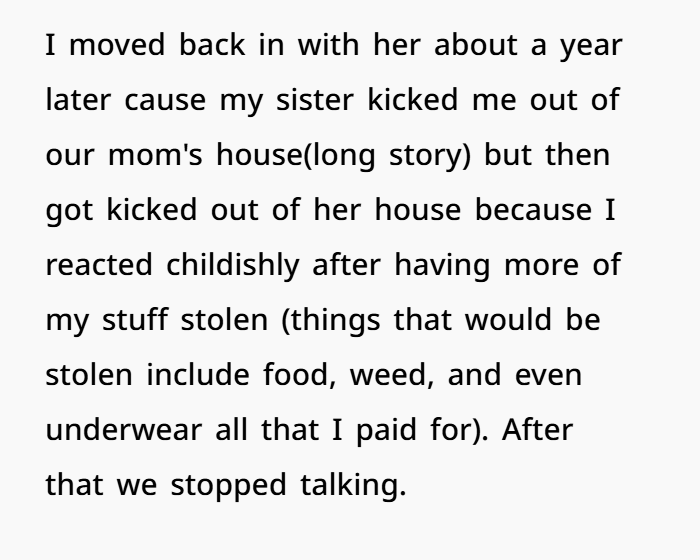

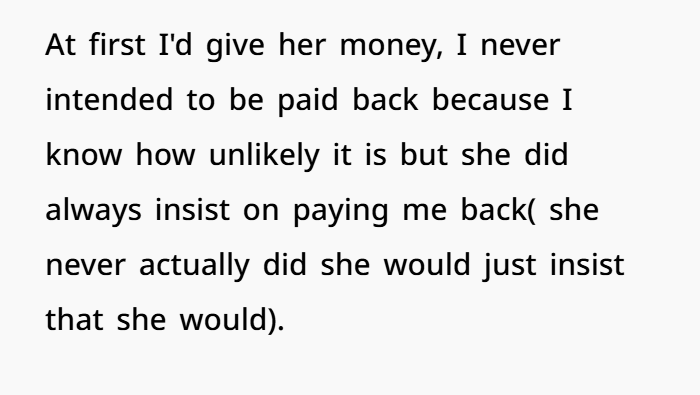
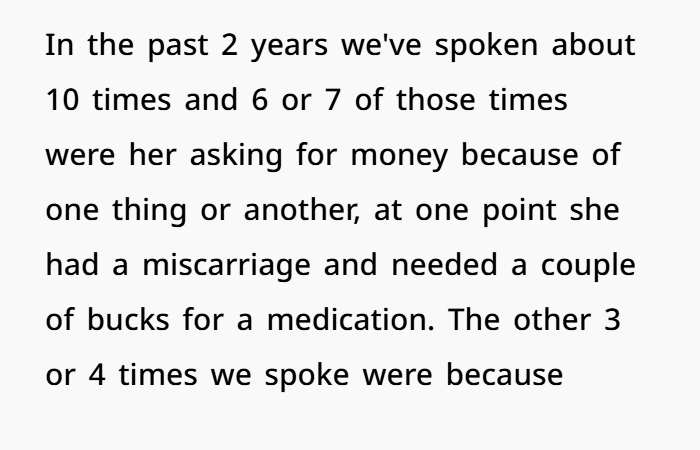
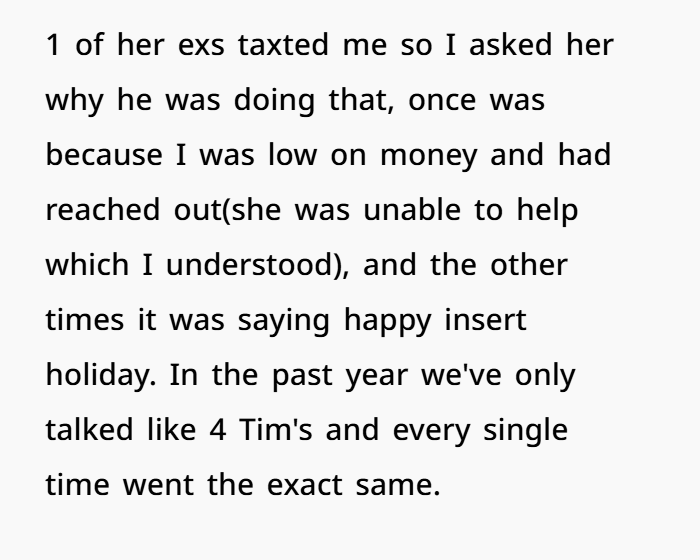
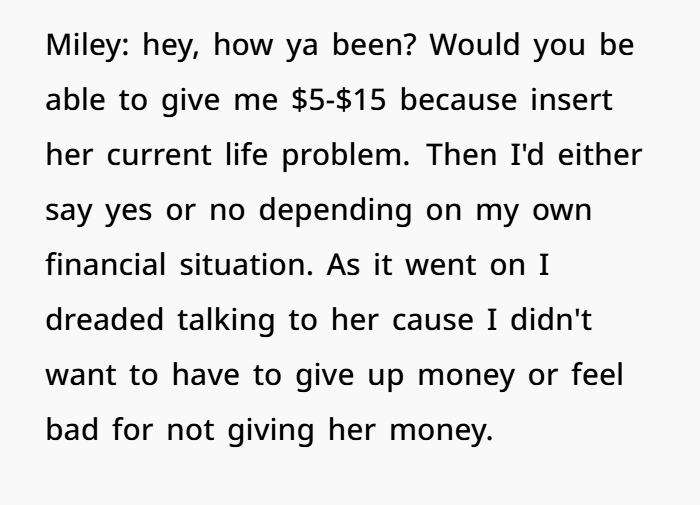
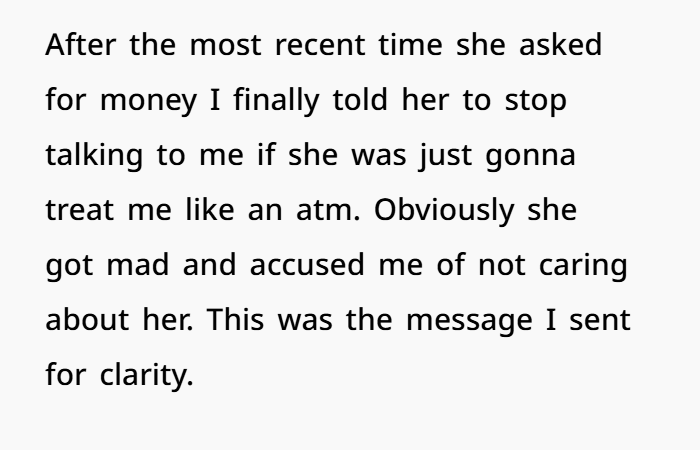
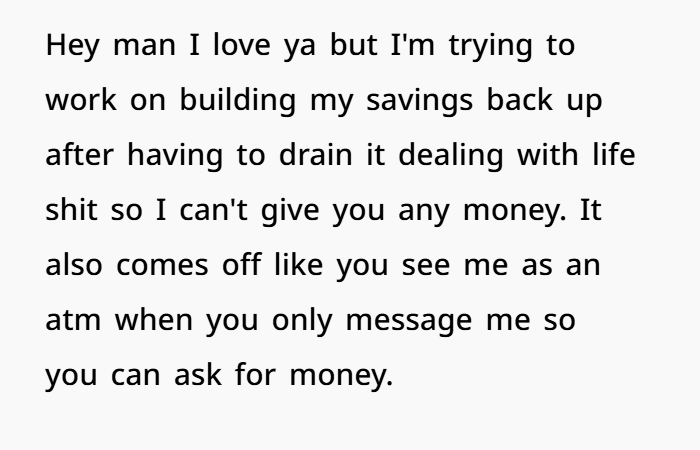
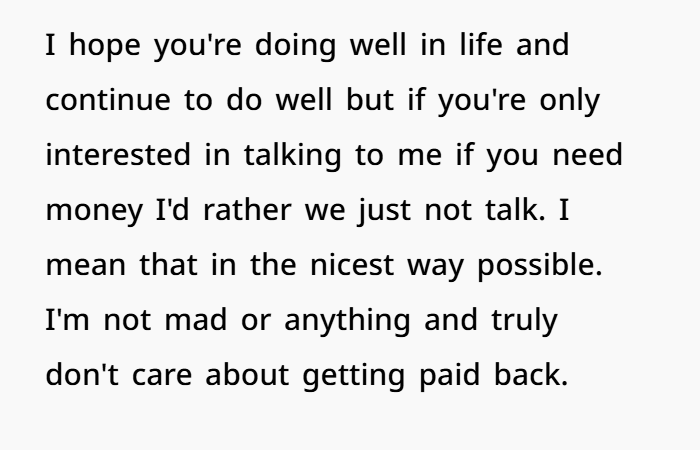
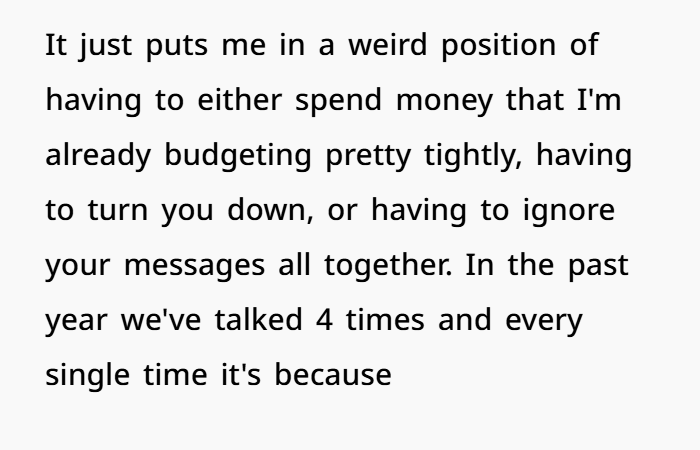
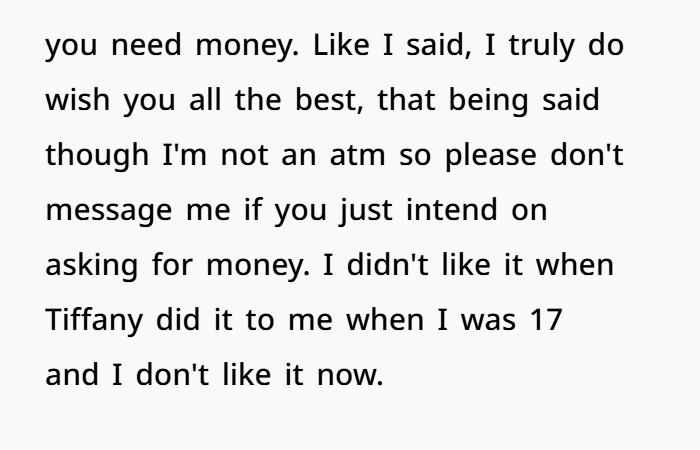
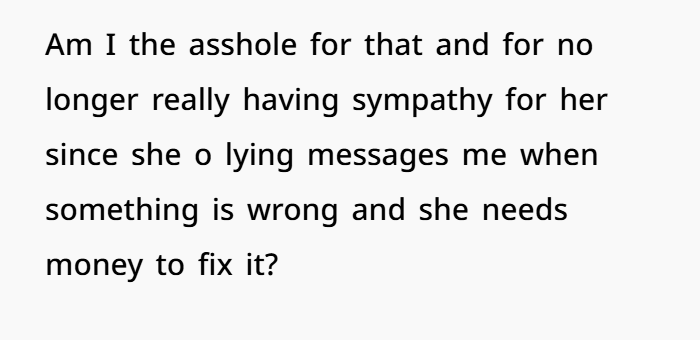
Okay, let’s really get into this, because money + friendship has been wrecking relationships since forever. You’re not the first person to feel like an ATM, and you won’t be the last.
1. Why money and friendship clash so often
The thing about mixing money and personal relationships is that it shifts the dynamic. A friendship should be about mutual trust, laughter, connection. But once money enters the picture — especially one-way money — it introduces power imbalance. The lender feels used, the borrower feels indebted or resentful, and suddenly the vibe is gone.
In fact, a 2017 Bank of America survey found that 57% of people had damaged or lost a friendship over money. The most common issue? Borrowing and never paying back, or always being “the one asking.”
So yeah, your experience is not rare.
2. Small amounts don’t feel small when they’re constant
On paper, $5–$15 isn’t a lot. That’s like a latte, lunch, or a cheap Uber ride. But the psychology of frequency changes it. If someone asks you ten times, suddenly you’ve given $100, and more importantly, you’ve been reminded ten times that the relationship is transactional.
Behavioral psychologists call this “nickel-and-diming burnout.” It’s not about the money itself — it’s about the mental weight of being asked repeatedly. That dread you felt when her name popped up? That’s your brain saying: this isn’t friendship anymore, this is obligation.
3. The guilt trap of “helping out”
Friends in need tug at guilt. You don’t want to seem heartless, especially knowing her struggles. She had a miscarriage, she’s poor, she probably leans on you because you’re stable now. That history makes it even harder to say no.
But here’s the truth: you can care about someone and still not fund them. Those two things are not mutually exclusive. Helping doesn’t have to mean money. Sometimes the kindest help is honesty — especially if the pattern is unhealthy for both sides.
4. Is it exploitation or survival?
There’s a fine line here. Let’s be fair to Miley: people ask for small amounts because it’s less intimidating than asking for big ones. And if she’s genuinely struggling, she may see you as the one safe person who won’t judge her. That’s survival mode, not necessarily malicious exploitation.
But your perspective matters too: if the only time she talks is when she’s short $10, then yes, it feels like exploitation. Relationships thrive on reciprocity. Even if she can’t give financially, she could give in other ways — emotional support, consistency, actual interest in your life. If that’s missing, then it’s not balanced.
5. The role of boundaries
Boundaries aren’t cruelty, they’re protection. You actually worded your message pretty kindly — you told her you love her, you wished her well, you explained the strain it puts on you. You didn’t curse her out or shame her.
This is what therapists call a “firm but compassionate boundary.” It’s not about punishing her, it’s about drawing a line so you can preserve your own peace. Without boundaries, resentment festers, and then even if you wanted to be there for her someday, you’d be too bitter.
6. Why she lashed out
Her anger at you — “you don’t care about me” — is classic deflection. People who rely on others financially often equate “money = love.” When you said no, she heard: you don’t love me anymore. That’s not fair, but it’s how some people process rejection.
It also may be embarrassment. She knows she doesn’t give back, knows she leans too much, and being called on it stings. Instead of admitting that, she attacked your character.
7. Similar case studies
- A Redditor shared that his old friend only called when he needed gas money. When he finally said, “stop calling unless it’s to hang out, not borrow,” the friend ghosted him. He said the relief outweighed the loss.
- Another story from Psychology Today highlighted a woman who lent her best friend $20 constantly. When she cut her off, the friend accused her of being “rich and heartless.” The therapist framed it like this: “you didn’t buy friendship, you only delayed its ending.”
- Historically, cultures have always warned about lending in close circles. Even Shakespeare wrote: “Neither a borrower nor a lender be; for loan oft loses both itself and friend.” And that was 400 years ago.
8. Long-term impact
So, what happens now? One of two things:
- She takes space, reflects, and maybe one day reaches out to rebuild something genuine.
- She cuts ties because you’re no longer a source of cash.

Both outcomes might hurt. But ask yourself this: do you want a friendship where the price of admission is $15? Or do you want one where the person shows up because they want you, not your wallet?
9. The bigger picture: financial boundaries in adulthood
We don’t talk enough about how adulthood requires financial boundaries. It’s not just about budgeting or saving, it’s about protecting your emotional resources. If you’re always bailing someone out, you’re draining two banks: your money and your mental health.
Setting limits is actually a sign of maturity. It says: I’ve built stability, and I won’t jeopardize it just to avoid awkward conversations. That’s growth.
People were glad that the poster stood her ground and felt that Miley was just treating their relationship as something transactional
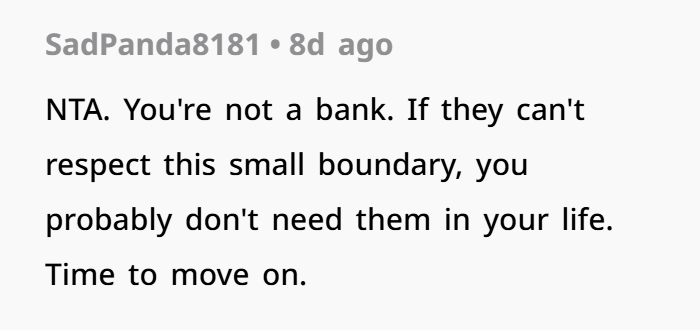
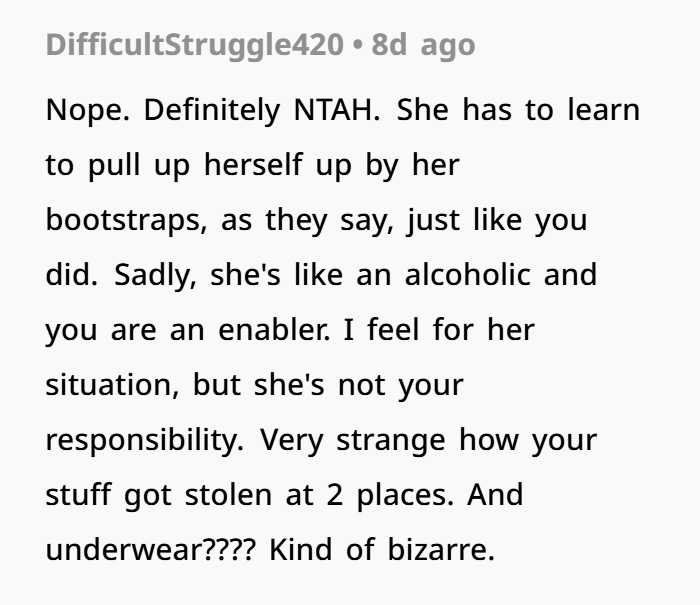
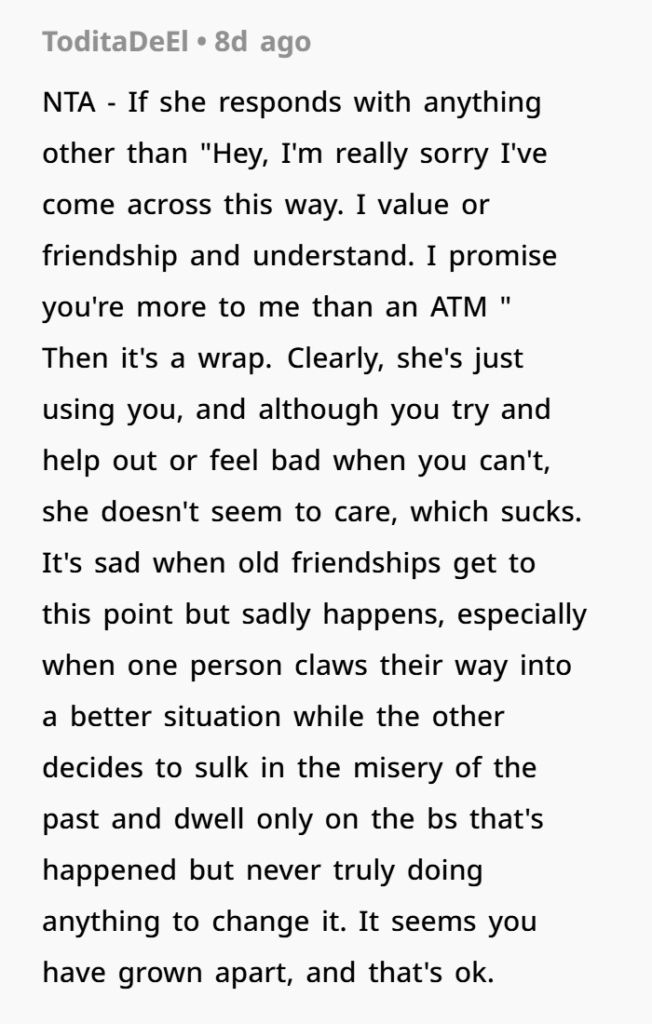
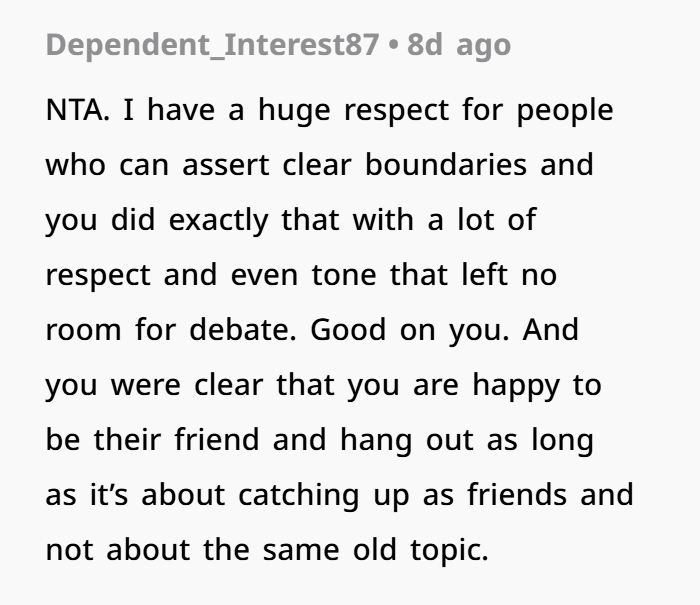

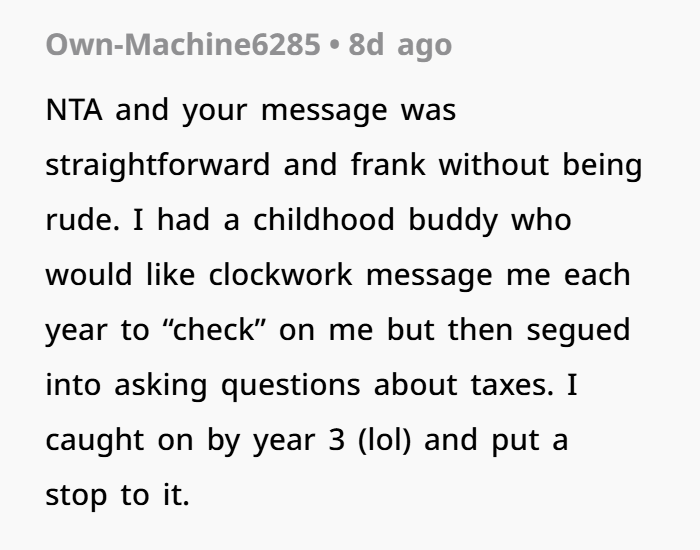
NTA — You weren’t cruel, you weren’t selfish, you were clear. Miley isn’t evil for asking, but she is wrong for only showing up when she needs something. That’s not friendship, that’s dependency.
You’re allowed to protect your finances, your peace, and your sense of self. It’s okay to wish her well from a distance.
Sometimes outgrowing a friend doesn’t mean hating them. It just means their role in your life has shifted. And that’s okay.

